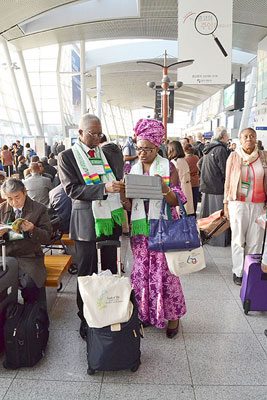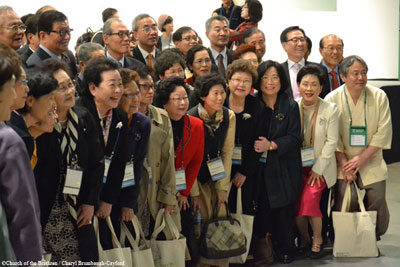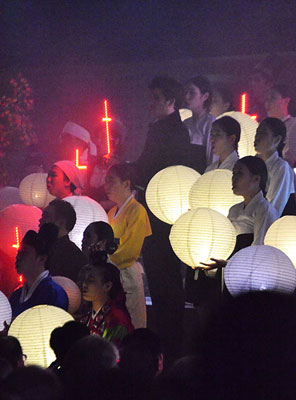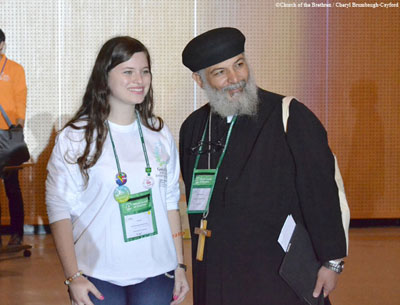
Each day at the World Council of Churches Assembly in Busan, Republic of Korea, has focused on a particular subtheme related to either the overall theme and prayer of the meeting–“God of life, lead us to justice and peace”–or the main goals of the ecumenical movement. Monday of this week focused on mission, Tuesday focused on unity. Here are just a few of the thoughts about mission and unity:
“Mission belongs to the very being of the church.” — A leader of the World Evangelical Alliance bringing greetings to the assembly during the plenary session on mission. He also said in his remarks that, “Witnessing to the gospel should never be done in a way that overturns human dignity.”
“The Korea churches are known worldwide for their efforts to grow the church and spread Christianity.”— The moderator of the plenary session on mission, Kirsteen Kim who is professor of Theology and World Christianity at Leeds Trinity University in the UK.
“The new statement declares that the church is commissioned to celebrate life…. The statement calls the church to communicate the good news of Jesus Christ with persuasion and conviction.”— Kirsteen Kim explaining the new World Council of Churches statement intended to guide ecumenical understandings of mission for the next years. “Together Towards Life: Mission and Evangelism in Changing Landscapes” has been adopted by the WCC Central Committee: www.oikoumene.org/en/resources/documents/wcc-commissions/mission-and-evangelism/together-towards-life-mission-and-evangelism-in-changing-landscapes .

“What this document proclaims is that the Holy Spirit is at work in eco-justice efforts around the world…in movements throughout the world that privilege the poor and marginalized. Mission…is from them to those of us at the privileged center. What this documents proclaims is that the Spirit is at work among all creatures, all peoples.”–
Stephen Bevans, a Catholic priest and professor of Mission and Culture at the Catholic Theological Union in Chicago. He spoke to the mission plenary about the connections between the WCC’s new mission statement and the assembly theme focus on life, justice, and peace.
“How do we witness to the gospel in this situation [of widespread economic disparities in the world]? … We cannot do this if our way of evangelism is based on profit and greed…. We can’t compartmentalize the gospel or sell it to highest bidder.” — Cecilia Castillo Nanjari of the Pentecostal Mission Church in Chile, speaking in the mission plenary.
“It’s important for Christians and Muslims to exercise their commonalities…. This is not a time to dramatize our differences.”— A Muslim leader from Indonesia bringing inter-religious greetings to the plenary on unity. He explained that Muslim and Christian relationships in Indonesia have existed for centuries in relative harmony. He added that from the Indonesian perspective, “being in a multicultural setting is indeed not a human wish but God’s will.”

“We believe that love softens truth, which can become hard. And that truth strengthens love.”— The CEO and director of the Lausanne Committee for World Evangelism, which was founded under the leadership of Billy Graham. He gave greetings to the assembly from the evangelical movement during the plenary on unity.
“Our unity as sisters and brothers in Christ is inextricably bound up with the unity God wills for the whole world. Our unity is not of our own making…. It is the giving and receiving of the love that flows between the persons of the Holy Trinity.”–Dame Mary Tanner, moderator of the plenary session on unity, and the past WCC president from Europe.

“We are not what we should be…. Nothing should restrain our passion for the unity of the church.” — A lament that the ecumenical movement still has a long way to go in bringing unity among Christians, voiced by Neville Callam, general secretary of the Baptist World Alliance and a minister in Jamaica.
“At 50 below zero, denominational differences disappear.” — Mark MacDonald, national indigenous bishop of the Anglican Church of Canada, speaking about working in the “far north” and his experience of the way basic human needs such as shelter becomes priorities over differences between people. “In the context of human need, disunity is a luxury you can’t afford,” he told the unity plenary.
Photos by Cheryl Brumbaugh-Cayford.